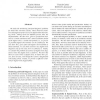Free Online Productivity Tools
i2Speak
i2Symbol
i2OCR
iTex2Img
iWeb2Print
iWeb2Shot
i2Type
iPdf2Split
iPdf2Merge
i2Bopomofo
i2Arabic
i2Style
i2Image
i2PDF
iLatex2Rtf
Sci2ools
ACSD
2006
IEEE
2006
IEEE
Monitoring and fault-diagnosis with digital clocks
We study the monitoring and fault-diagnosis problems for dense-time real-time systems, where observers (monitors and diagnosers) have access to digital rather than analog clocks. Analog clocks are infinitely-precise, thus, not implementable. We show how, given a specification modeled as a timed automaton and a timed automaton model of the digital clock, a sound and optimal (i.e., as precise as possible) digital-clock monitor can be synthesized. We also show how, given plant and digital clock modeled as timed automata, we can check existence of a digital-clock diagnoser and, if one exists, how to synthesize it. Finally, we consider the problem of existence of digital-clock diagnosers where the digital clock is unknown. We show that there are cases where a digital clock, no matter how precise, does not exist, even though the system is diagnosable with analog clocks. Finally, we provide a sufficient condition for digital-clock diagnosability.
Related Content
| Added | 10 Jun 2010 |
| Updated | 10 Jun 2010 |
| Type | Conference |
| Year | 2006 |
| Where | ACSD |
| Authors | Karine Altisen, Franck Cassez, Stavros Tripakis |
Comments (0)

